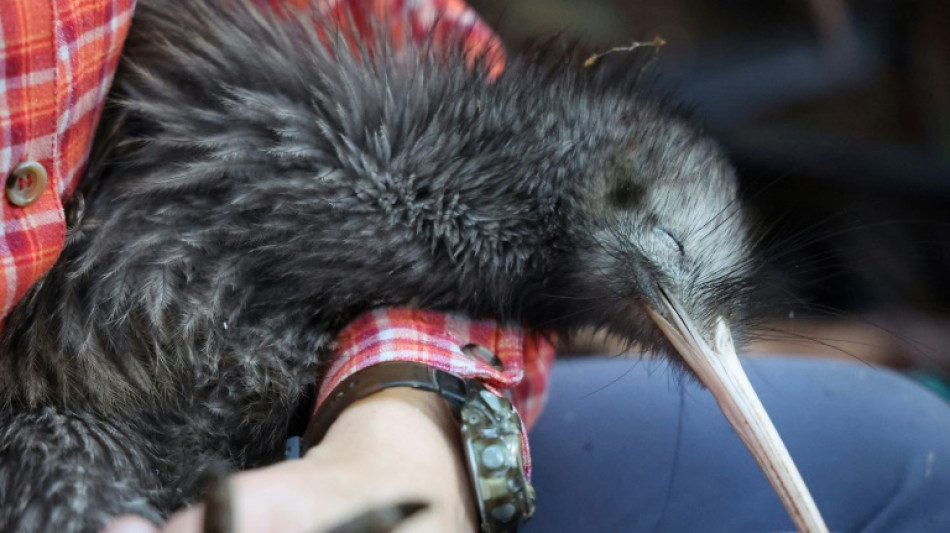
-
 French court cracks down on Corsican language use in local assembly
French court cracks down on Corsican language use in local assembly
-
Russia expels UK diplomat accused of espionage

-
 Israeli security cabinet to discuss ceasefire as US says deal 'close'
Israeli security cabinet to discuss ceasefire as US says deal 'close'
-
COP29 president blames rich countries for 'imperfect' deal

-
 No regrets: Merkel looks back at refugee crisis, Russia ties
No regrets: Merkel looks back at refugee crisis, Russia ties
-
IPL history-maker, 13, who 'came on Earth to play cricket'

-
 Prosecutors seek up to 12-year terms for French rape trial defendants
Prosecutors seek up to 12-year terms for French rape trial defendants
-
Laos hostel staff detained after backpackers' deaths

-
 Hong Kong LGBTQ advocate wins posthumous legal victory
Hong Kong LGBTQ advocate wins posthumous legal victory
-
Rod Stewart to play Glastonbury legends slot

-
 Winter rains pile misery on war-torn Gaza's displaced
Winter rains pile misery on war-torn Gaza's displaced
-
'Taiwan also has baseball': jubilant fans celebrate historic win

-
 Russia pummels Ukraine with 'record' drone barrage
Russia pummels Ukraine with 'record' drone barrage
-
Paul Pogba blackmail trial set to open in Paris

-
 Landmine victims gather to protest US decision to supply Ukraine
Landmine victims gather to protest US decision to supply Ukraine
-
Indian rival royal factions clash outside palace

-
 Manga adaptation 'Drops of God' nets International Emmy Award
Manga adaptation 'Drops of God' nets International Emmy Award
-
Philippine VP denies assassination plot against Marcos

-
 Hong Kong's legal battles over LGBTQ rights: key dates
Hong Kong's legal battles over LGBTQ rights: key dates
-
US lawmakers warn Hong Kong becoming financial crime hub

-
 Compressed natural gas vehicles gain slow momentum in Nigeria
Compressed natural gas vehicles gain slow momentum in Nigeria
-
As Arctic climate warms, even Santa runs short of snow

-
 Plastic pollution talks: the key sticking points
Plastic pollution talks: the key sticking points
-
Indonesia rejects Apple's $100 million investment offer

-
 Pakistan police fire tear gas, rubber bullets at pro-Khan supporters
Pakistan police fire tear gas, rubber bullets at pro-Khan supporters
-
Hong Kong same-sex couples win housing, inheritance rights

-
 Indonesia digs out as flooding, landslide death toll hits 20
Indonesia digs out as flooding, landslide death toll hits 20
-
Liverpool's old guard thriving despite uncertain futures

-
 Mbappe takes reins for Real Madrid in Liverpool clash
Mbappe takes reins for Real Madrid in Liverpool clash
-
As AI gets real, slow and steady wins the race

-
 China's Huawei to launch 'milestone' smartphone with homegrown OS
China's Huawei to launch 'milestone' smartphone with homegrown OS
-
Porzingis and Morant make triumphant NBA returns

-
 Hong Kong top court affirms housing, inheritance rights for same-sex couples
Hong Kong top court affirms housing, inheritance rights for same-sex couples
-
Philippines, China clashes trigger money-making disinformation

-
 Most Asian markets drop, dollar gains as Trump fires tariff warning
Most Asian markets drop, dollar gains as Trump fires tariff warning
-
England 'not quivering' ahead of New Zealand Test challenge

-
 Bethell to bat at three on England Test debut against New Zealand
Bethell to bat at three on England Test debut against New Zealand
-
Trump vows big tariffs on Mexico, Canada and China

-
 New Zealand and England to play for Crowe-Thorpe Trophy
New Zealand and England to play for Crowe-Thorpe Trophy
-
Scheffler, Schauffele and McIlroy up for PGA Player of the Year

-
 Trump to face less internal pushback in new term: ex-commerce chief
Trump to face less internal pushback in new term: ex-commerce chief
-
Extreme weather threatens Canada's hydropower future

-
 More than 34,000 register as candidates for Mexico judges' election
More than 34,000 register as candidates for Mexico judges' election
-
Australia ban cycling's Richardson for life after UK defection

-
 Internal displacement in Africa triples in 15 years: monitor
Internal displacement in Africa triples in 15 years: monitor
-
'Remarkable global progress': HIV cases and deaths declining

-
 Social media firms raise 'serious concerns' over Australian U-16 ban
Social media firms raise 'serious concerns' over Australian U-16 ban
-
Tiger to skip Hero World Challenge after back surgery

-
 MLB shifts six 2025 Rays games to avoid weather issues
MLB shifts six 2025 Rays games to avoid weather issues
-
US women's keeper Naeher retiring after Europe matches


New Zealand fights to save its flightless national bird
New Zealand's treasured kiwi birds are shuffling around Wellington's verdant hills for the first time in a century, after a drive to eliminate invasive predators from the capital's surrounds.
Visitors to New Zealand a millennium ago would have encountered a bona fide "birdtopia" -- islands teeming with feathered creatures fluttering through life unaware that mammalian predators existed.
The arrival of Polynesian voyagers in the 1200s and Europeans a few hundred years later changed all that.
Rats picked off snipe-rails and petrels, mice chewed through all the seeds and berries they could find, leaving little for native birds to peck on.
Possums -- introduced for fur -- stripped trees bare. Rabbits bred like, well, rabbits, devouring meadows and paddocks alike.
Heaping disaster upon disaster, stoats were introduced to kill the rabbits but instead killed wrens, thrushes, owls and quails.
The population of native flightless birds like the kakapo and kiwi plummeted.
The Department of Conservation estimates there are only around 70,000 wild kiwi left in New Zealand.
Despite the bird being a beloved national symbol, few New Zealanders have seen one in the wild.
However, numbers are rising again thanks to more than 90 community initiatives working nationwide to protect them.
One such group is The Capital Kiwi Project, a charitable trust backed by millions of dollars from government grants and private donations.
- Special connection -
"Ever since people came to New Zealand, we have had a special connection to the kiwi," founder and project leader Paul Ward told AFP.
"They are central to Maori myth. Our sports teams, our rugby league teams, our defence force and, even when we go overseas, we are known as kiwis.
"They are tough, resilient, adaptable, all values we think of as New Zealanders, but most of us have never seen a kiwi before."
Ward estimates wild kiwi last roamed the Wellington area more than a century ago.
The bid to save them required a sustained conservation effort.
The project had to first deal with the kiwi's natural enemies prowling through the undergrowth.
Local dog owners were invited to sessions to teach their pets to steer clear of kiwi while out for walks.
The project also had to declare war on stoats.
An adult kiwi can fight off a stoat using its powerful legs and sharp claws but a chick has no chance, Ward explained.
The project laid a huge network of 4,500 traps over an area equivalent to nearly 43,000 football pitches on the hills surrounding Wellington. The traps have claimed 1,000 stoats so far.
After "blitzing stoats", as Ward puts it, the predator population was low enough for the project to release the first batch of kiwi last November.
The birds were carefully transported nearly 500 kilometres (310 miles) from a captive breeding programme to a Wellington school, where they were welcomed by a traditional Maori ceremony.
Ward said a hush came over the 400-strong crowd as they caught their first glimpse of a kiwi when the first bird was released.
- Rare sightings -
"The power of that moment was palpable," he said. "Our job is to bottle that and spread it across the hills of Wellington."
Regular check-ups show that the first wave is thriving.
"Two months after we released the birds, we were ecstatic to discover they had gained weight," Ward said.
"One had put on 400 grams -- that's a considerable weight gain even for a human over Christmas or Easter. There's plenty of food for them on these hillsides."
Ward said the goal is to release 250 birds over the next five years to establish a large wild kiwi population.
He wants their distinctive shrill cry to become part of everyday life on the outskirts of the capital.
"It's our duty to look after the animal that's gifted us its name," Ward said.
"As one of our volunteers said, 'if we can't look after the thing we're named after we deserve to be renamed idiots'."
X.Brito--PC


